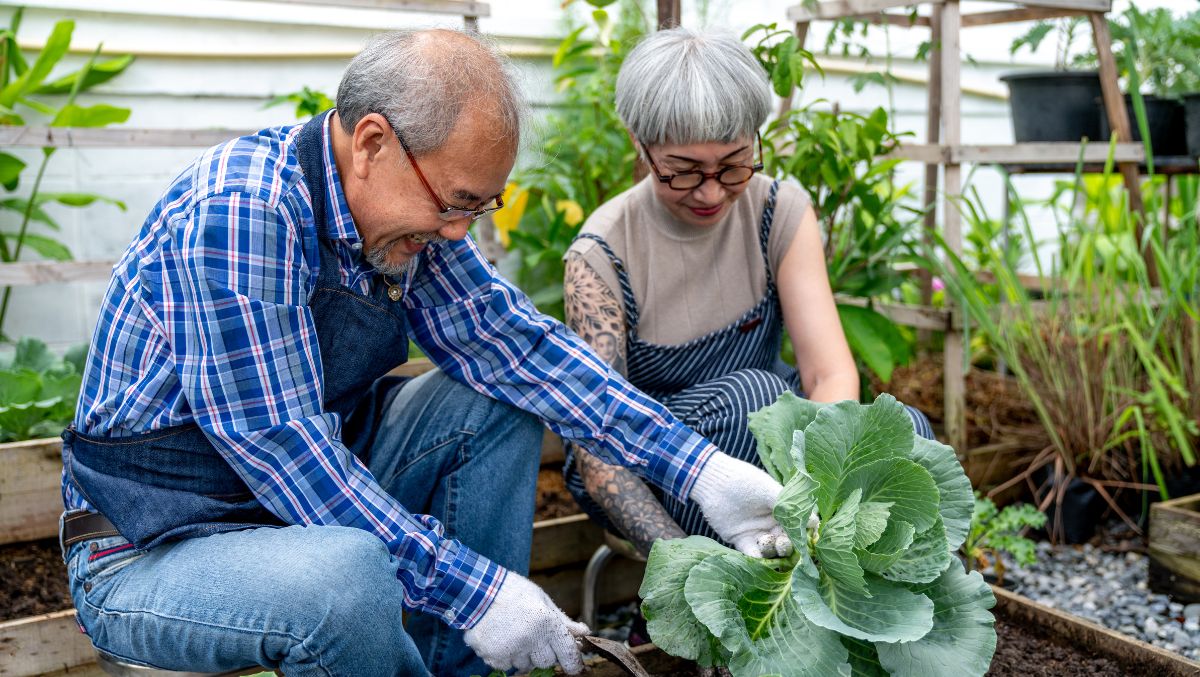5 Reasons To Garden in Your Golden Years
Discover the top reasons to garden in retirement — growing produce or blooms — including physical, mental and monetary benefits.
by Andrea Norris-McKnight

As we age, finding activities that enrich our lives both physically and mentally is essential. Gardening is blooming into a popular hobby among retirees—and for good reason. This engaging activity is not just about planting and caring for flowers or vegetables; it’s about nurturing your well-being, too.
In this article, we dig into the many benefits of growing a garden as we grow older.
1. Physical Well-being: Nature’s Gym
Gardening is a surprisingly effective way to maintain physical health. Whether turning compost, pulling weeds or planting seedlings, gardening involves stretching, bending and lifting that can enhance flexibility, strength and even endurance. Regular exercise can help reduce the risk of chronic diseases and falls, which may minimize medical costs in retirement.
The best part? It’s a low-impact activity you can adjust to fit your physical capabilities. Plus, regularly getting small doses of sunlight gives you a healthy dose of Vitamin D, which is essential for bone health. Just don’t forget the sunscreen!
Gardening tasks also require the use of fine motor skills, helping to maintain and improve hand-eye coordination and dexterity.
Related: Creating a Labor-Saving Garden
2. Mental Clarity: A Natural Stress Reliever
Engaging with plants and soil has been shown to reduce stress, alleviate anxiety and promote well-being. It’s a therapeutic exercise that allows you to focus on the task at hand, whether it’s pruning your roses or harvesting your homegrown tomatoes, keeping your mind sharp and spirits high.
3. Cognitive Benefits: Growing Your Mind
Gardening isn’t just good for the body; it can also help maintain the brain. Planning a garden layout, learning about different plant species and problem-solving when pests invade or plants don’t thrive are all mind-stimulating activities.
This continuous learning process can help keep cognitive functions sharp, offering a natural defense against age-related cognitive decline. It’s like a workout for your brain, with a bonus of beautiful blooms or delicious veggies.
Related: Growing More Brain on a Budget
4. Monetary Advantages: The Gift that Keeps on Giving
Starting a garden typically requires an upfront investment, but the long-term benefits can be quite rewarding.
Growing your own produce can lead to small or significant savings on grocery bills. And we all know the health benefits of eating produce. If you prefer flower gardening, your blooms and plants could make wonderful gifts, saving you on overpriced bouquets or plants.
A well-maintained garden may also enhance your home’s curb appeal, potentially increasing its market value.
5. Community and Connection: Sharing the Harvest
Gardening may be a solitary activity but also offers opportunities to connect with others.
Sharing tips with fellow gardening enthusiasts, swapping seeds or produce and participating in community garden projects can lead to meaningful relationships and a sense of belonging. It’s a way to stay engaged with your community, possibly share your knowledge with younger generations and enjoy the fruits (and vegetables) of your labor with friends and family.
Gardening in Retirement Is More Than a Hobby
Gardening can enhance your quality of life during your golden years. It offers physical exercise, mental stimulation and emotional satisfaction. Plus, the financial and social benefits are the cherry tomatoes on top!
Why not put on your gardening gloves and start sowing the seeds of a fulfilling retirement hobby? Your body, mind and wallet will thank you. Happy gardening!
Reviewed March 2025
About the Author
Andrea Norris-McKnight took over as the editor of The Dollar Stretcher and After 50 Finances after working for the previous editor for almost 15 years. She has also written for Money.com, GOBankingRates.com, HavenLife.com and The Sacramento Bee.
Sign me up for a comfortable retirement!
Popular Articles
- Comparing Retirement Housing Options
- How We Retired With Almost No Savings
- How Retirees Can Live on a Tight Budget
- 9 Things You Need to Do Before You Retire
- What You Need to Know About Long Term Care Insurance Before You Retire
- You Didn’t Save Enough for Retirement and You’re 55+
- Could Debt Derail Your Retirement? A Checklist
- Your Emergency Fund In Retirement: A Comprehensive Guide
- Managing Your 401k In Your 50s

